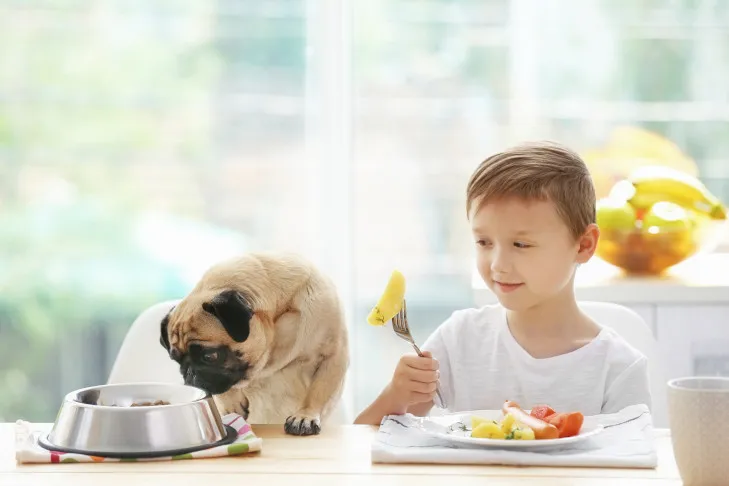Onions are a staple in many human cuisines, adding a distinct flavor to countless dishes. However, for our canine companions, this seemingly innocent vegetable poses a serious health risk. What In Onions Is Bad For Dogs, exactly? The answer lies in a specific compound that can wreak havoc on their red blood cells, leading to a dangerous condition known as hemolytic anemia. Understanding this threat is crucial for every dog owner to ensure their pet’s safety and well-being. Keeping your dog safe often involves knowing what are you not supposed to feed your dog to avoid accidental poisoning.
The Toxic Culprit: N-Propyl Disulfide
The primary reason onions are toxic to dogs is a compound called N-propyl disulfide. This substance belongs to a group of organosulfur compounds found in allium vegetables. When ingested by dogs, N-propyl disulfide causes oxidative damage to their red blood cells. It attaches to the oxygen molecules within these cells, significantly reducing their capacity to carry oxygen throughout the body.
Furthermore, this compound tricks the dog’s immune system into identifying its own red blood cells as foreign invaders. This leads to a process called hemolysis, where the red blood cells are prematurely destroyed. The rapid destruction of red blood cells results in hemolytic anemia, a life-threatening condition where the body cannot produce new red blood cells quickly enough to replace the damaged ones.
Every Part of the Onion Plant is a Danger
It’s not just the onion bulb that’s harmful; all parts of the onion plant are toxic to dogs. This includes the flesh, leaves, and even the juice. The danger extends regardless of how the onion is prepared: raw, cooked, fried, or powdered. This is why vigilance is key when preparing meals, as even small remnants or cooking water can be hazardous.
The toxicity isn’t limited to onions alone. The entire Allium family, which includes other common ingredients like shallots, leeks, chives, and garlic, contains similar harmful compounds and should be kept away from dogs. For pet owners with multiple species in the household, it’s important to note that onions are even more toxic to cats than they are to dogs, emphasizing the need for universal caution. To learn more about other harmful plant-based foods, you might be interested in what veggies dogs can t eat.
Beware of Processed Forms
One of the most insidious forms of onion toxicity comes from processed products. Onion and garlic powders are significantly more potent than fresh onions because they are concentrated. These powders are often hidden ingredients in a surprisingly wide range of human foods, from soups and sauces to baby food and seasoned snacks. Always check the labels of any human food you consider sharing with your dog. Any item containing onion powder should be strictly off-limits.
 Cavalier King Charles Spaniel resting its head on the kitchen table begging.
Cavalier King Charles Spaniel resting its head on the kitchen table begging.
How Much Onion is Dangerous for Dogs?
The amount of onion required to cause toxic effects can be surprisingly small. Generally, it only takes about 100 grams of onion per 20 kilograms (approximately 45 pounds) of a dog’s body weight to induce symptoms. This means that a medium-to-large onion (which can weigh around 100-150 grams) could be dangerous for a 45-pound dog.
For smaller dogs, the toxic dose is even less. Given that many dogs are opportunistic eaters and might readily consume unattended onion rings, a dropped slice of pizza with onion, or even an onion-rich casserole if given the chance, the risk of accidental ingestion is a serious concern for pet owners.
Symptoms of Onion Toxicity in Dogs
If you suspect your dog has eaten onions, it’s crucial to monitor them closely for symptoms, which can sometimes be delayed and appear a few days after ingestion. The signs of onion toxicity are primarily those of anemia. These include:
- Lethargy: Unusual tiredness or a general lack of energy.
- Weakness: Difficulty standing, walking, or a reduced ability to perform normal activities.
- Decreased appetite: A noticeable reduction in interest in food.
- Pale gums: A lack of healthy pink color in the gums, indicating poor blood oxygenation.
- Fainting: Sudden collapse due to a lack of oxygen to the brain.
- Reddish urine: This is a telltale sign of red blood cell destruction (hemoglobinuria).
In addition to these anemia-related symptoms, dogs suffering from onion toxicity may also exhibit vomiting, an elevated heart rate (tachycardia), and excessive panting as their body struggles to get enough oxygen.
 Pug eating with a boy at the table.
Pug eating with a boy at the table.
Treating Onion Toxicity in Dogs
The most important step in managing onion toxicity is prevention. Never intentionally feed your dog onions or any related Allium vegetables. Keep all onion-containing foods, including powders and cooked dishes, out of your dog’s reach.
If you know or strongly suspect that your dog has consumed onions, immediate veterinary attention is paramount. Do not wait for symptoms to appear. Contact your veterinarian or a pet poison helpline (such as the Pet Poison Helpline) immediately. Be prepared to provide details such as what your dog ate, approximately how much, and when the ingestion occurred.
Your veterinarian will assess your dog’s condition based on symptoms, physical examination, and blood work. They may induce vomiting if the ingestion was very recent. Supportive care is a key component of treatment, helping your dog’s body recover and produce new, healthy red blood cells. In severe cases, where red blood cell destruction is extensive, a blood transfusion may be necessary. The faster your dog receives professional veterinary care, the better their prognosis. Onion toxicity can be fatal, so prompt action can significantly improve their chances of recovery. Do not attempt to induce vomiting at home unless specifically directed by a veterinarian. For more guidance on what healthy options dogs can enjoy, consider exploring what foods can you give dogs.
Healthy Alternatives: Safe Vegetables for Your Dog
While onions are a definite no-go, many other vegetables are perfectly safe and even beneficial for dogs in small, appropriate amounts. These can make excellent, healthy treats or additions to their diet.
Consider offering your dog fresh carrots, which are great for dental health and vision. Cucumbers are a hydrating, low-calorie option, and green beans are packed with vitamins and fiber. Always ensure vegetables are plain, unseasoned, and cut into bite-sized pieces to prevent choking. Introduce new foods gradually and in moderation to avoid upsetting your dog’s stomach.
Conclusion
Understanding what in onions is bad for dogs, specifically the N-propyl disulfide compound and its effects on red blood cells, is essential for every responsible pet owner. The risk of hemolytic anemia makes onions and other Allium plants a serious danger to our canine friends. By knowing the toxic components, recognizing the symptoms of poisoning, and acting quickly if exposure occurs, you can protect your dog from potentially fatal consequences. Always prioritize prevention by keeping all forms of onions and related vegetables out of your dog’s reach and opting for safe, healthy alternatives. Consult your veterinarian for guidance on your dog’s diet and for any concerns regarding potential toxic exposures to ensure your furry friend stays healthy and happy. For a comprehensive look at dog nutrition, read our article on what should dogs eat to stay healthy.
